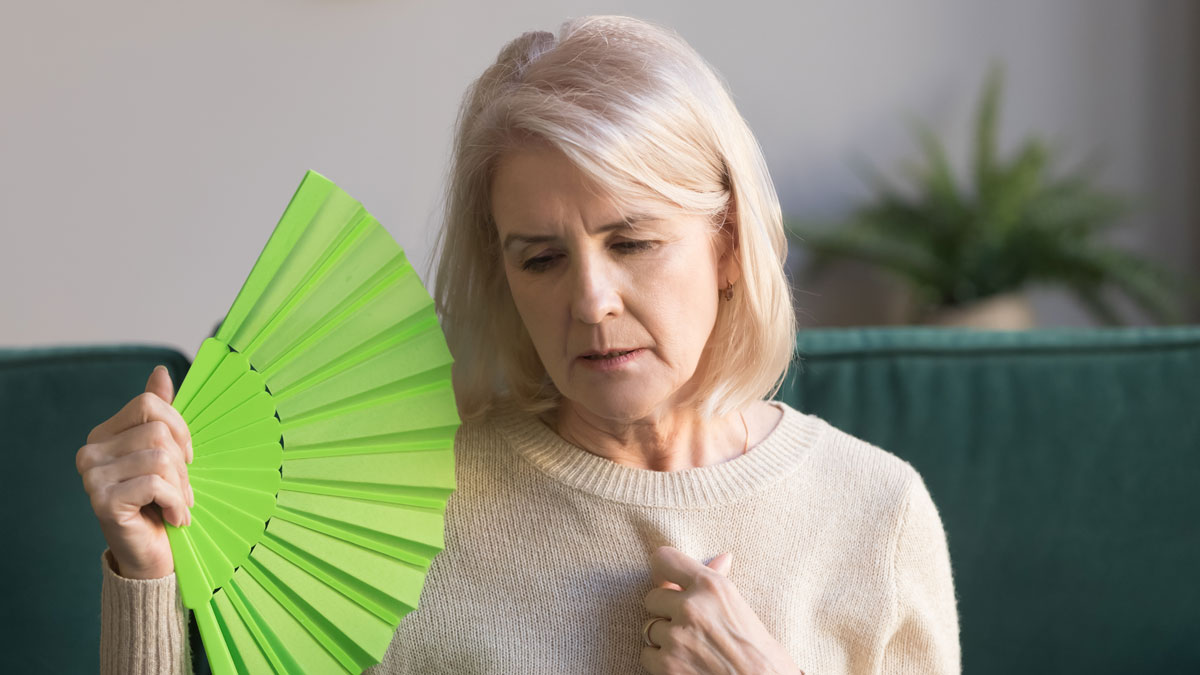Many women will voluntarily admit that menopause hot flashes are one of the worst experiences they’ve had to go through in life.
I think it’s safe to say, I agree. After all, hot flashes make us lose some control over our bodies, sometimes even with hot flashes long after menopause.
Our temperature goes up and we can’t control it. We start to sweat and feel uncomfortable. And, our heart rate sometimes rises more than normal.
The worst part about a hot flash is that they’re nearly uncontrollable once they start. Yes, there are ways to prevent or even reduce hot flash occurrences, but hot flashes still stink even if they’re only far and few between.
The main takeaways to really nip hot flashes in the bud are hormonal/medicinal treatments, staying active, cooling that body temperature, getting adequate sleep, and watching what you eat/drink.
Table of Contents [hide]
Hormone Replacement Therapy
There are levels of hot flashes that we have to deal with. I like to describe them as minor, medium, and heavy.
The minor hot flashes are just small bursts of hotness rushing over our entire body.
The medium hot flashes are difficult to put up with, but not impossible. They affect us regularly, but not all the time. Sweating often occurs.
The heavy hot flashes are the ones that are practically unbearable. If you’re experiencing these hot flashes, it’s best to seek medical care.
Doctors will often recommend HRT, or hormone replacement therapy for women struggling to deal with hot flashes.
HRT can help reduce hot flashes causes, and it can also help improve mood and ease vaginal dryness.
The medical treatment plan should only be in effect for five years or less. Some short term HRT treatments can lead to problems associated with blood clots, breast cancer, endometrial cancer, and gallbladder inflammation.
Keep in mind, that once HRT is completed, there is a chance that the hot flashes stopped then started again.
Antidepressants
Prescription treatments, including antidepressants, are also helpful mechanisms in preventing and treating hot flashes.
Not every woman wants to lean on medications everyday to treat menopausal symptoms, but it is an option you can consider.
Low-dose antidepressants, such as fluoxetine, paroxetine, and venlafaxine can combat hot flash symptoms.
Other medications that your doctor may prescribe include Clonidine (commonly used for blood pressure), Gabapentin (used to treat seizures), Brisdelle (paroxetine formula created specifically for hot flashes), and Duavee (a conjugated estrogen formula).
Additionally, B Complex vitamins and ibuprofen are great helpers.
I always suggest speaking to your doctor about new medications. If it’s prescribed, your doctor will clearly be the person recommending the medication.
However, if it’s an over the counter medicine for hot flashes, like B Complex, ibuprofen, or any others you’re curious about, I suggest running it by your physician before implementing it into your daily routine.
Magnesium for hot flashes has also been a recent finding that works for some women.
Stay Active
It’s hard to tell what causes hot flashes in menopause all the time, but healthy weights and staying active can help combat such symptoms.
Maintaining a healthy weight is good for women of all ages, but it’s especially good for women going through the perimenopause, menopause, and postmenopause stages of life.
Women who are overweight or obese can actually experience more frequent menopausal symptoms, including hot flashes.
Plus, the more body weight you have, the more body heat will be generated.
I suggest staying active on the regular because weight has such a high effect on the probability of hot flashes happening.
You can start slow and do exercises like yoga and daily stretches.
Ultimately, you’ll want to get into regular exercise daily, or almost daily. Walking, jogging, running, biking, swimming, and other cardio-related exercises are perfect for the state of activeness you should be in while going through menopause.
Plus, if you really feel on top of your game with your exercise schedule, you’re more likely to decrease your overall risk of additional diseases, such as heart disease and osteoporosis.
Staying active has a multitude of benefits when it comes to menopause, and specifically hot flashes, but it also has even more positive results for other areas of life, too.
Stay Cool
The obvious trick to get quick relief for hot flashes is to keep your body cool.
However, when we go through menopause, it’s easier said than done to know when to stay cool/warm up. Our bodies are a mystery during menopause; we’re lucky if we know what situations will make us cold and what situations will make us warm.
Let me put it this way – considering our hormones are all over the place, our body temperature goes wild. One minute we’re hot, the next minute we’re cold. It’s inconvenient.
There are ways to think ahead, though, and make sure you’re prepared for either a hot or a cold situation.
Dress in layers. If you’re cold, you’ll have clothes to keep you warm. If you’re warm, you have layers that you can strip away.
Always keep a bottle of cold water on you, in your purse. Or, make sure you have access to cold water. If you’re wondering how to stop hot flashes fast, a few sips will do the trick.
Cotton is your friend while you’re going through menopause. Cotton pajamas and cotton bed sheets. They’ll give your body more of a cooling effect than other materials will.
Keeping a cold pack handy is also a relevant idea, if applicable, and if you’re in a place where it won’t become warm/start melting on the inside.
Usually, the best place is to keep it at your desk or by your bedside table. Work fridges and home fridges are just around the corner to pop the cold pack back into the refrigerator or freezer if need be.
Get Some Sleep
Getting relief from insomnia is so difficult when we’re going through menopause. The hot flashes and night sweats make it near impossible to fall asleep and stay asleep.
For starters, kicking the AC on or using fans in the bedroom is a great way to reduce your body temperature.
If you fall asleep quickly at night with cold temperatures, don’t hesitate to adjust the room accordingly before your head hits the pillow.
If you need to be all cuddly and warm to fall asleep, that’s perfectly fine, too. Just a forewarning, that you may have to change the room temperature in the middle of the night after a night sweat starts to happen.
A lot of women think it’s a good idea to use sleeping medications to feel more rested when they wake up in the morning. But, that is NOT the best idea.
If you can, try to avoid sleeping pills, as this could make other menopause symptoms worse in the long run, including hot flashes. Insomnia may still be prevalent during certain nights.
As previously stated, staying active is great for women dealing with menopause. But, daily exercise also makes it easier for women to fall asleep and stay asleep at night.
Another suggestion would be to avoid alcohol and caffeine close to bedtime, as both could inadvertently affect sleep.
If you want to positively affect your sleep schedule, try taking a warm bath or shower right before bed to relax the muscles and mind.
Milk products will also get the job done, just make sure they don’t contain caffeine.
Avoid Spicy Foods
Spicy foods used to get my face hot and flushed before I went through menopause, nevermind when I started dealing with menopause.
Foods to avoid during menopause consist of jalapenos, buffalo, and hot sauces, amongst other products.
Such foods can antagonize and trigger a hot flash that may or may not get more intense due to the food consumed.
You’re probably sitting there, reading this, thinking that spicy foods are generally great for anyone. They speed up the metabolic rate throughout the body and they’re a healthy additive to a normal diet.
But trust me when I say, if you don’t want the hot flashes to stick around, you’ll nix the spicy foods and just start spicing your food up with spices that aren’t spicy.
Instead, research some estrogen rich foods for menopause that genuinely enjoy and start implementing them into your daily diet.
Avoid Caffeine and Alcohol
Night sweats (hot flashes at night) and insomnia go hand in hand as two of the worst symptoms associated with menopause.
Caffeine only makes those two symptoms worse, especially if you drink it later on in the day.
If you feel like you’re lacking energy, try drinking cold water or going for a brisk walk to wake up your mind and body. Staying hydrated and active always jolt me awake, you just have to find your happy medium.
And be careful of the morning coffee, while you’re at it. Some women can still handle it and have a morning cup of Joe, but others start to feel jittery and anxious during menopause when drinking caffeine.
Just be mindful of how your body is acting and reacting.
Then there’s alcohol.
Decreased levels of estrogen trigger insomnia and night sweats. These decreased levels of estrogen then decrease the levels of melatonin being produced in the body, meaning the main sleep hormone is practically deprived.
In addition to this deprivation, alcohol right before bed (about two drinks an hour before going to sleep) can also affect melatonin levels in the body. Therefore, alcohol can drastically contribute to insomnia and night sweats on a nightly basis – if you drink nightly.
Avoid Smoking Cigarettes
In general, smoking cigarettes is bad for your heart health, your lung health, and your overall health. But smoking cigarettes can also make menopausal symptoms worse, specifically hot flashes.
Once you start perimenopause, put the cigarettes out to decrease the percentage of torture you’ll be put through.
If at all possible, it’s best to stay away from secondhand smoke as well. It won’t be the end of the world if you’re around cigarette smoke, it’ll just make the symptoms a bit more irritating.












No Comments Add one
Leave a Comment